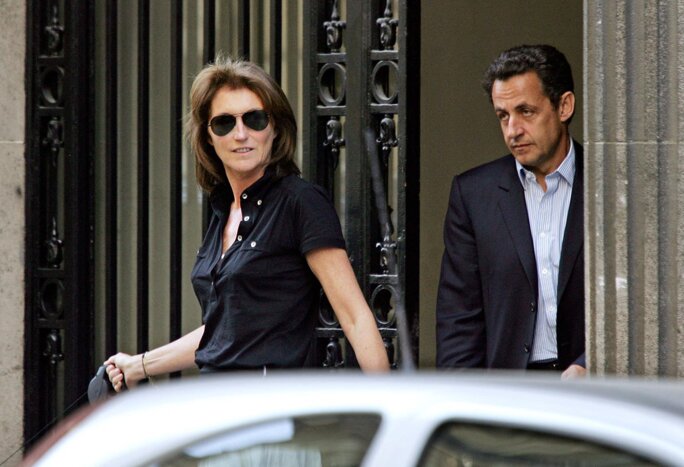Cécilia Attias, the former wife of Nicolas Sarkozy, was interviewed in June as a witness by police acting under the authority of a judicial investigation into the suspected illegal funding of her then husband’s 2007 presidential election campaign by the regime of the late Libyan dictator Muammar Gaddafi.
During the four hours of questioning on June 1st, she was asked to comment on evidence gathered so far in the long-running judicial investigation and the actions of members of Sarkozy’s close entourage, including an alleged secret offshore payment by the Gaddafi regime to one of them, which she described as “ugly”.
The nine-year judicial probe, now led by Judge Aude Buresi, has placed Sarkozy, 67, under investigation for “corruption”, “criminal conspiracy”, “illicit campaign financing” and “receiving the proceeds of the misappropriation of public funds”.
Sarkozy vigorously denies any wrongdoing.
Under French law, a person can only be placed under investigation if a magistrate establishes serious and (or) concurring evidence that they committed a crime. It is only if and when a magistrate decides to send an individual for trial that they are formally charged.
In two separate cases unconnected with the Libyan funding allegations, Sarkozy was last year convicted of corruption and influence peddling for seeking to bribe a judge, and for illicit campaign financing in relation to his failed 2012 re-election bid. Sarkozy has appealed both convictions, which carry jail sentences that, under French law, are automatically suspended during the appeal process.
Mediapart has learnt that in the statements given by Cécilia Attias to police in June, recorded on 22 pages, she distanced herself from several members of the political inner circle surrounding Sarkozy, with whom she has a son from their 11 years of marriage (after their divorce, she married Richard Attias, a US-based French businessman active in PR and event management).
During the interview by police in June, she began by describing the former French president as “an honest man, profoundly upright”, adding: “Afterwards, I have discovered a lot of things in the press. I fell off my chair more than once, but I saw nothing of all that. For me, the father of my son was someone who was upright, honest, courageous.”

Enlargement : Illustration 1

She said that description also applied to Claude Guéant, a longstanding chief of staff to Sarkozy during the latter’s ministerial posts between 2002 and 2007, and who played a key role in the contacts made with the Gaddafi regime, beginning in 2005. Guéant, 77, who after Sarkozy’s election in 2007 was appointed as chief of staff of the presidential office, the Élysée Palace, and subsequently as interior minister, is also placed under investigation in the Gaddafi funding probe, notably for “corruption”, “criminal conspiracy” and “illicit financing of an election campaign”.
In 2017, Guéant, whose powerful role under Sarkozy earned him the nicknames of “the cardinal” and “the vice-president”, was handed a two-year prison sentence (upheld on appeal) for embezzling public funds between 2002 and 2004 when he was chief of staff to Sarkozy at the interior ministry. The sums came from cash intended to be used for expenses incurred during police operations.
In January this year, Guéant was given a one-year jail sentence, which he has appealed against, for favouritism over the attribution by the Élysée of needless opinion surveys carried out without public tenders, and at a cost of several millions of euros, by companies belonging to presidential advisors.
Attias, 64, described Guéant as “a high-ranking civil servant, devoted to his country”. She added: “When I heard what I saw[sic] in the press, I was very astonished. Either I was very naïve or I was very stupid, but for me it did not at all enter into the picture I had nor into what I had lived.”
Nicolas Sarkozy did not respond to Mediapart’s request for comment. Similarly contacted, Claude Guéant insisted that he had “never seen or heard mention of Libyan funding” for Sarkozy’s 2007 election campaign.
The police interview in June was the first time that Attias has given official statements to the judicial investigation, and about those who were close to Sarkozy. One of these was Thierry Gaubert, who began his professional association with Sarkozy in the early 1980s after the latter became mayor of the wealthy Paris suburb of Neuilly-sur-Seine. Gaubert was appointed in 1994 as deputy chief of staff to Sarkozy when he was budget minister. Attias described the two men as “very close, pals”.
Gaubert, 71, is also placed under investigation in the Libyan funding probe, for suspected “criminal conspiracy”. That centres notably on a payment of 440,000 euros made into his secret bank account in The Bahamas in 2006 which originated from the Gaddafi regime. Presented with an account of this, Attias said, “It’s ugly, all that”. She said that at the time she worked on an unpaid basis for her husband at the interior ministry but insisted she knew nothing of Gaubert’s alleged involvement in the funding from Libya.
Thierry Gaubert did not respond to Mediapart’s approach to him for comment.
About her appreciation of Gaubert at a personal level, she told the police: “I was never very much of a fan. I don’t know why. My instinct. Neither of him nor, for that matter, of Brice Hortefeux. He was a friend of Nicolas, I respected [that], but I had friends of my own.”
Like Gaubert, Brice Hortefeux, 64, is another longstanding friend and ally of Sarkozy’s, their friendship beginning when they were teenagers. After Sarkozy’s election in 2007, he gave Hortefeux three successive ministerial posts, first as minister for “immigration, integration and national identity”, then as labour minister and finally as interior minister – after which he was succeeded by Guéant in 2011.
Hortefeux, who was also involved in the pre-2007 contacts between Sarkozy’s political team and the Gaddafi regime, is under investigation for criminal conspiracy and illicit funding of an electoral campaign.
During the June 1st interview by the police, they detailed to her the nature of the relationship between Hortefeux and the Paris based French-Lebanese businessman Ziad Takeddine, who acted as a secret intermediary between Sarkozy’s team and the Gaddafi regime. Reacting to the evidence presented to her, Attias declared: “It seems to me to be surreal. I don’t have the same respect for Brice Hortefeux as I have for Claude Guéant.”

Enlargement : Illustration 2

“Since forever, Brice is the shadow of Nicolas Sarkozy,” she added. “[…] Brice Hortefeux only had a career in the furrow [ploughed by] Nicolas Sarkozy. All the posts that he obtained were given to him by Nicolas Sarkozy.” She said the former president, who in a book once described Hortefeux as “a brother”, is “very loyal in friendship”.
Before his election as president, Sarkozy was preparing his bid while serving as interior minister from 2005 to 2007 under the presidency of Jacques Chirac. During that same period, Hortefeux served as a junior minister, under the interior minister, with responsibility for local authorities. During her interview by police, Attias was told that their investigations had established that in 2005, Hortefeux travelled to Libya to meet with Gaddafi's brother-in-law and security chief Abdullah Senussi, who the judicial probe has identified as a central figure in the alleged secret funding by the Tripoli regime of Sarkozy’s election campaign.
In 1999, a Paris court had sentenced Senussi, in absentia, to life imprisonment for his part in the 1989 bombing of a French UTA airline DC10 passenger plane over Niger, in which 170 people lost their lives. Following the sentence, an international arrest warrant was issued against Senussi.
When junior minister Hortefeux met Senussi, he was not accompanied by any French diplomat, nor security guard, nor translator, but was accompanied only by the intermediary Ziad Takieddine. Attias was told that the meeting occurred just days before Senusssi ordered the transfer of 440 million euros into Thierry Gaubert’s secret bank account in The Bahamas. “That’s staggering,” Attias said. “All that is beyond me”.
Contacted by Mediapart, Brice Hortefeux declined to comment on his meeting with Senussi, but insisted that he “formally” denounced “lies and factual errors” about the events, without offering further details.
According to the findings of the judicial investigation, Claude Guéant, when chief of staff to interior minister Nicolas Sarkozy, also met with Senussi, three months before the meeting involving Hortefeux, and in similar conditions. Numerous witness statements and documents gathered by the investigation attest to how, between 2005 and 2009, Sarkozy’s political entourage were mobilised in trying to overturn the international arrest warrant issued by France against Senussi.
Bernard Squarcini was head of the French domestic intelligence service under Sarkozy’s presidency. Following Sarkozy’s defeat in the presidential elections in 2012, Squarcini set up a security consultancy firm, one of whose clients was French luxury goods group LVMH. He is placed under investigation for having established an illegal spying system, targeting individuals and companies on behalf of LVMH, which led the group to pay out 10 million euros in a settlement with the public prosecution services in December last year.
Squarcini, 66, is cited in the judicial probe into the alleged funding of Sarkozy’s 2007 election campaign – although he does not face criminal proceedings. This centres on his organisation of an operation in May 2012 to smuggle out of France Bashir Saleh, the former head of the Gaddafi regime’s multi-billion-dollar Libyan African Investment Portfolio, part of the country’s sovereign wealth fund, and who also served as Gaddafi's chief of staff.
The operation was carried out just days after the revelation by Mediapart on April 28th 2012 of a document recovered from the archives of the then-toppled Gaddafi regime which detailed its agreement to fund Nicolas Sarkozy’s 2007 presidential election campaign. The document was signed by Gaddafi’s intelligence chief Moussa Koussa and addressed to Saleh.
Saleh had fled to France after the overthrow of Gaddafi, and since March 2012 had been the subject of a ‘red notice’ issued by Interpol for his arrest pending an eventual extradition back to Libya, where he was wanted by the country’s new authorities on charges of fraud, misappropriation of public funds and abuse of power. On May 3rd 2012, he was secretly smuggled out of France by plane to his native Niger, before settling in South Africa.
During her interview by police on June 1st this year, Cécilia Attias was questioned about what she knew of the relations between Squarcini and Alexandre Djouhri, a key suspect in the Libyan funding investigation and who was also involved in the operation to smuggle Saleh out of France. “Squarcini, I knew him, but he is not someone towards whom I have much respect,” she said in her statement. “Squarcini is not the type [of person] that France deserves […]. I think that the [French] republic, it should be respected.”
Contacted by Mediapart, Squarcini declined to offer any comment.
Attias was also questioned about her role in the liberation, in July 2007, two months after Sarkozy’s election, of five Bulgarian nurses and a Palestinian doctor who had been arrested and detained in Libya since February 1999.
They were falsely accused of having deliberately infected several hundred children with the HIV virus at the hospital where they worked in Benghazi, Libya’s second city. The United Nations Human Rights Committee later detailed some of the torture techniques used by the Libyan security services to extract confessions from the medics, including electric shocks on genitals, suffocation, strangulation, cigarette burns, sleep deprivation, ice-cold showers and rape.
The liberation of the five nurses and doctor became a major humanitarian cause among the international community, and for the European Union in particular, and after eight years of diplomatic and judicial efforts, including direct negotiations with Gaddafi including talks in which Attias personally took part, the six were finally released on July 24th 2007.
In her statement detailing the affair, Attias described it as an “extraordinary” story. She recounted how she travelled to Libya for two meetings with Gaddafi to press for the release of the medics. The first took place in the dictator’s portable Bedouin tent when, she said, she adopted a firm stance. “He was astonished that a woman dared to talk to him like that, with so much firmness, not to say hardness,” she said.
The second meeting took place in Gaddafi’s bunker. “I entered into a room alone,” she recalled. “There was a riding crop in the office, which I picked up. I sat down. Then Gaddafi arrived. He wasn’t in a normal state […]. I told him that if something happened to me, he would have everyone on his back so he had better not touch me or approach me.” She described them as having a “surrealist conversation” in English that lasted three or four hours, during which she “improvised everything” before finally, at the last minute, obtaining Gaddafi’s agreement to release the nurses and doctor.
Attias said she knew nothing about the role played by Ziad Takieddine who, the judicial probe has established from witness testimony and documents, had been present in Libya at the time and in constant contact with the Élysée. “I never heard about that from anyone, neither at the time nor afterwards,” she declared. “And Takieddine, I didn’t even know at the time he existed. But then, he wasn’t in my sightline. Perhaps I was being protected, I don’t know.”
In 2013, police phone taps captured a conversation between the late PR and advertising executive Jean-Michel Goudard, a close friend and advisor of Sarkozy’s, and Michel Gaudin, a former Paris police prefect who became chief of staff of the former president’s private office. During their chat, Goudard suggested that Attias’s role in the liberation of the six medics was insignificant. “To send [Cécilia Attias] for the Bulgarian nurses who were already freed…I mean, one has seen incredible things,” Goudard told Gaudin.
Questioned in June about that comment, Attias declared: “That is absolutely not true, I don’t know why he said such a silly thing.”
-------------------------
- The original French version of this report can be found here.
English version by Graham Tearse
-------------------------
If you have information of public interest you would like to pass on to Mediapart for investigation you can contact us at this email address: enquete@mediapart.fr. If you wish to send us documents for our scrutiny via our highly secure platform please go to https://www.frenchleaks.fr/ which is presented in both English and French.
-------------------------



